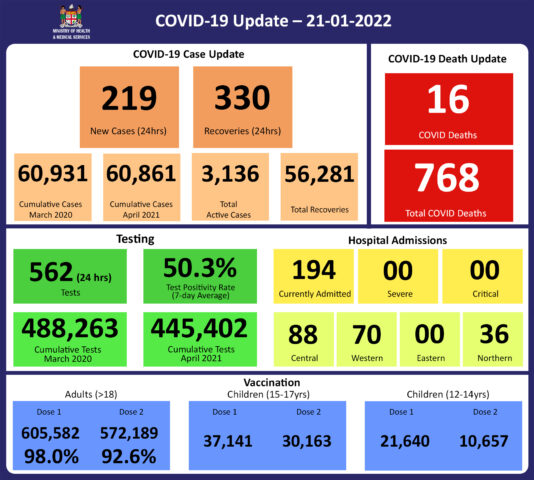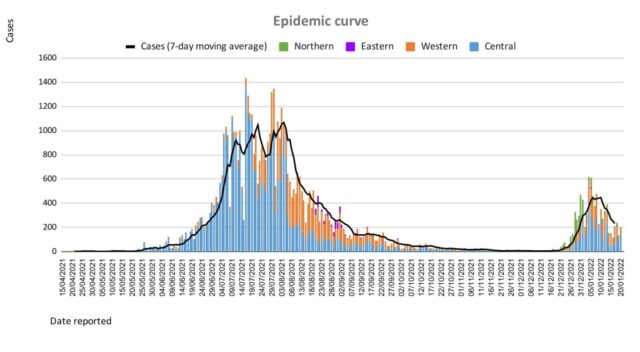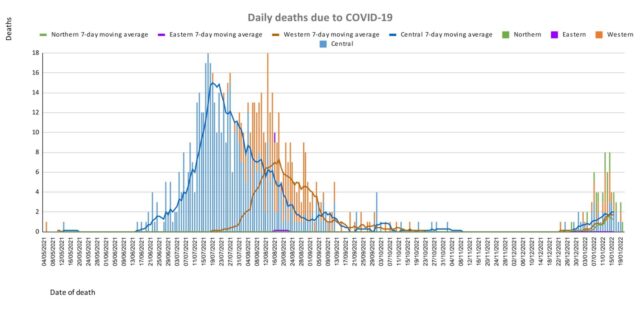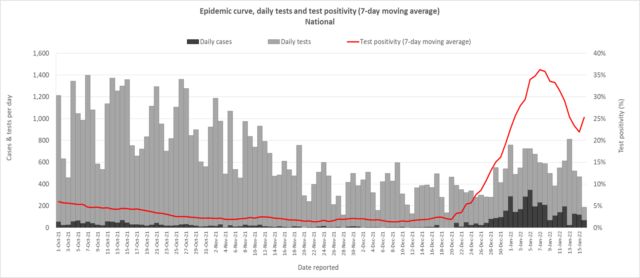COVID-19 Update 21-01-2022
COVID-19 Situation Update
Friday 21st January 2022
Public Advisory:
The deaths reported tonight were people who were at high risk of developing severe COVID-19 disease and died at home or on arrival at the hospital. These were people who were over the age of 50 or had significant underlying medical conditions (non-communicable disease). And even more sadly, 14 of the people who died were not vaccinated. As a society, we must do our very best to protect the most vulnerable in our communities, and the best protection against severe disease and death is getting two doses of the vaccine, getting the booster when you are due, and suppressing transmission through COVID-19 safe measures. The Ministry of Health and Medical Services continues to conduct outreach to remote communities in the Northern Division in the effort to increase vaccination coverage. But we are asking our communities to also encourage the vulnerable people you know to get vaccinated as soon as possible.
We are also strongly advising anyone who is in the high-risk group and develops any COVID-19 symptoms, to please come forward to be tested and reviewed by our medical staff. Symptoms include cold or flu-like symptoms such as runny nose, sneezing, nasal congestion, sore throat, cough, body ache, fever. If you test positive you will be placed on a care pathway that will involve monitoring and escalation of care if required. We also need everyone to be aware of the symptoms of severe COVID-19 and immediately seek emergency medical care if they are present:
Shortness of breath or difficulty breathing, pain or pressure in the chest, confusion, coughing blood, difficulty staying awake, pale, grey or blue coloured skin.
Non-communicable disease (NCDs) and COVID-19
A predominant contributor to severe outcomes in all the waves of COVID 19 in Fiji has been NCD-related comorbidities such as heart disease, kidney disease, diabetes, obesity and hypertension. The Ministry of Health and Medical Services attributes 5,700 deaths in 2020 due to complications related to NCDs. The total burden of NCDs on the Fijian society –– due to lost hours of work and healthcare needs –– is estimated to be $406 million annually, according to the Economic Burden Report Fiji, 2018.
Given the severe negative health effects of overconsuming sugar, sugar-sweetened beverages, and sugar-filled processed foods, the Ministry of Health and Medical Services hopes that the increase in sugar prices will curb sugar consumption by members of the public and promote healthier alternatives, such as reducing the consumption of sugars and use of natural honey.
Together with ensuring optimal treatment compliance of those with NCDs, the promotion of a healthy diet and exercise needs to be an integral part of as part of building resilience together with
We need employers and community leaders to help mainstream this type of support system for vulnerable persons by creating a list of vulnerable persons, facilitating support to secure good access to medical care, ensuring oversight so that if they develop flu-like symptoms they test early and provide a supportive environment to ensure that the sick will feel encouraged to seek treatment and not try to wait things out; this means at least in the short term we are able to direct service towards the protection of the vulnerable in our community.
Building Resilience
As we go through the current wave of COVID-19, Fijians need to adopt practices that build resilience. We know that there remains a high risk of resurgence of endemic variants and the arrival of new variants. Our socioeconomic survival depends on our ability to build and sustain individual and community-wide resilience. We should expect that COVID-19 will be endemic, however, we need to appreciate that “endemic” doesn’t mean harmless. Endemic means that we expect continued circulation of the disease in the community although at this stage it is too early to determine our expected baseline levels. Leptospirosis, Typhoid, and Dengue are endemic in Fiji and they are associated with serious outcomes, especially when cases increase above expected levels and result in an epidemic (outbreak). Building resilience demands that we adopt healthier lifestyles, make COVID safe behavior a habit that we adopt and support others to adopt, mainstream medical and community-wide oversight over vulnerable persons such that we support those at risk to have timely access to health care, build up community surveillance mechanisms that depend on both medical and non-medical data sources to inform us early of impending epidemics or outbreaks.
Our objective is to live with the virus and at the same time ensure a high level of transmission suppression, and prevention of severe outcomes. Endemic diseases need constant suppression until their consequences are as low as the usual flu viruses.
Vaccine Plus Approach
Please remember that for the current wave we are facing, vaccination on its own is not enough for our protection. The Vaccine Plus approach means that we are keeping ourselves sufficiently protected by:
1) getting fully vaccinated (which includes getting a booster shot when due), plus
2) strictly adhering to the COVID transmission suppression protocols.
The COVID transmission suppression protocols are:
- Individual COVID safe measures (masking, physical distancing, avoiding crowds, hand hygiene), and
- Settings-based measures (social gathering restrictions, indoor capacity restrictions, ventilation, and curfews).
Following the Vaccine Plus Approach means that everyone has a role to play to protect themselves from the current outbreak, as well as future outbreaks from other new variants that can arise. The approach means that the Ministry and Govt will provide the opportunity for all eligible Fijians to access safe and effective vaccines that protect us from severe diseases and deaths due to COVID-19. It also means that we take responsibility for adhering to the COVID transmission suppression protocols on an individual basis, as well as on a collective basis in all community settings we engage in – whether it is at work, in school, at our local house of worship, or during a traditional ceremony. The Vaccine Plus Approach means we are collectively and equally responsible for our protection and our health – not just the Ministry of Health or the front-liners!
Vaccine Based Restrictions On Children Under 18 years
The Ministry reiterates the WHO endorsed position that children under 18 years should not be restricted from social interactions on the basis of vaccination status. Overall, there are proportionally fewer symptomatic infections, and cases with severe outcomes from COVID-19 in children and adolescents, compared with older age groups, and therefore such restrictions are not justified from a public health perspective. This is especially so that with the added requirement to adhere to COVID safe measures, the inherent lower risk in children and adolescents is further reduced. So, while the Ministry is encouraging the vaccination of our children less than 18 years, it is still not compulsory, and children are safe to interact in our communities while employing COVID safe measures at all times outside their households.
Healthcare workers and community-wide response
Health workers and frontliners have done their best for two years to protect as many of us as possible; we must now do our part to protect them, by getting vaccinated, and by taking precautions to prevent becoming infected, or infecting someone else. As we have seen all over the world, even if Omicron is less likely to cause severe disease or deaths compared to previous variants, higher levels of transmission mean more people getting infected in a shorter time period, which may still lead to a high number of hospitalizations and deaths. And when people are admitted with COVID, rather than for COVID, medical staff are still required to organize themselves to provide care for COVID and non-COVID patients. This means more hospital resources are needed and more staff are required to work, which puts further strain on an already stressed health system. COVID-19 is also not the only health challenge that health workers face every day. Taking the pressure off health systems will enable them to deal with the many other health challenges that our people face. Therefore, the COVID 19 response should now be a community-wide, whole-of-society program, where everyone plays their role.
As such while vaccination deployment will continue, our current efforts will be to support other Ministries and business entities to develop COVID safe protocols and to provide the appropriate oversight processes that ensure we all function in a COVID safe manner.
Together with the Ministry of Commerce, Trade, Tourism, and Transport we have put together a number COVID-Safe Protocols as approved by the respective Permanent Secretaries, and these are published online at https://www.mcttt.gov.fj/covid-19-business-protocols/, with effect from 17 January 2022—
- Protocol for COVID-Safe Business Operations;
- Protocol for COVID-Safe Retail Operations;
- Protocol for COVID-Safe Operations for Houses of Worship;
- Protocol for Enhanced Ventilation;
- Protocol for COVID-Safe Operations for Hairdressers and Salon Services;
- Protocol for COVID-Safe Operations for Tattoo Parlours;
- Protocol for COVID Safe Gym Operations;
- Protocol for COVID-Safe Cinema/Movie Theatre Operations;
- Protocol for COVID-Safe Operations of Bars and Taverns;
- Protocol for COVID-Safe Gaming Venue Operations;
- Protocol for COVID-Safe Tourism Accommodation Operations;
- Protocol for Land Transport Services;
- Protocol for COVID-Safe Operations for Outdoor Events;
- Protocol for COVID-Safe Operations for Independent Event Halls and Hire Venues.
The COVID-19 Incident Management Unit had been rolling out community engagement training with community health workers, turaga-ni-koro, mata-ni-tikina, church leaders, school managers, headteachers, and principals in rural areas throughout Fiji. The outcome of this training is COVID-19 preparedness equipping local communities with the knowledge to carry out community-based surveillance, care pathways for COVID-19 cases, and COVID-19 safe measures.
Last Updated on 3 years by Publishing Team





